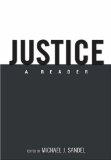Summary | Excerpt | Reading Guide | Reviews | Beyond the Book | Readalikes | Genres & Themes | Author Bio

Critics' Opinion:
Readers' Opinion:
First Published:
Sep 2009, 320 pages
Paperback:
Aug 2010, 320 pages
 Book Reviewed by:
Book Reviewed by:
Micah Gell-Redman
Buy This Book
This dilemma points to one of the great questions of political philosophy:
Does a just society seek to promote the virtue of its citizens?
Or should law be neutral toward competing conceptions of virtue, so
that citizens can be free to choose for themselves the best way to live?
According to the textbook account, this question divides ancient
and modern political thought. In one important respect, the textbook
is right. Aristotle teaches that justice means giving people what they
deserve. And in order to determine who deserves what, we have to
determine what virtues are worthy of honor and reward. Aristotle
maintains that we can’t figure out what a just constitution is without
first reflecting on the most desirable way of life. For him, law can’t be
neutral on questions of the good life.
By contrast, modern political philosophers—from Immanuel Kant
in the eighteenth century to John Rawls in the twentieth century—
argue that the principles of justice that define our rights should not rest
on any particular conception of virtue, or of the best way to live. Instead,
a just society respects each person’s freedom to choose his or
her own conception of the good life.
So you might say that ancient theories of justice start with virtue,
while modern theories start with freedom. And in the chapters to
come, we explore the strengths and weaknesses of each. But it’s worth
noticing at the outset that this contrast can mislead.
For if we turn our gaze to the arguments about justice that animate
contemporary politics—not among philosophers but among ordinary
men and women—we find a more complicated picture. It’s true that
most of our arguments are about promoting prosperity and respecting
individual freedom, at least on the surface. But underlying these arguments,
and sometimes contending with them, we can often glimpse
another set of convictions—about what virtues are worthy of honor
and reward, and what way of life a good society should promote. Devoted though we are to prosperity and freedom, we can’t quite shake
off the judgmental strand of justice. The conviction that justice involves
virtue as well as choice runs deep. Thinking about justice seems inescapably
to engage us in thinking about the best way to live.
What Wounds Deserve the Purple Heart?
On some issues, questions of virtue and honor are too obvious to deny.
Consider the recent debate over who should qualify for the Purple
Heart. Since 1932, the U.S. military has awarded the medal to soldiers
wounded or killed in battle by enemy action. In addition to the honor,
the medal entitles recipients to special privileges in veterans’ hospitals.
Since the beginning of the current wars in Iraq and Afghanistan,
growing numbers of veterans have been diagnosed with post-traumatic
stress disorder and treated for the condition. Symptoms include recurring
nightmares, severe depression, and suicide. At least three hundred
thousand veterans reportedly suffer from traumatic stress or major depression.
Advocates for these veterans have proposed that they, too,
should qualify for the Purple Heart. Since psychological injuries can be
at least as debilitating as physical ones, they argue, soldiers who suffer
these wounds should receive the medal.
After a Pentagon advisory group studied the question, the Pentagon
announced, in 2009, that the Purple Heart would be reserved for
soldiers with physical injuries. Veterans suffering from mental disorders
and psychological trauma would not be eligible, even though they
qualify for government-supported medical treatment and disability
payments. The Pentagon offered two reasons for its decision: traumatic
stress disorders are not intentionally caused by enemy action, and they
are difficult to diagnose objectively.
Did the Pentagon make the right decision? Taken by themselves, its
reasons are unconvincing. In the Iraq War, one of the most common
injuries recognized with the Purple Heart has been a punctured eardrum,
caused by explosions at close range. But unlike bullets and
bombs, such explosions are not a deliberate enemy tactic intended to
injure or kill; they are (like traumatic stress) a damaging side effect of
battlefield action. And while traumatic disorders may be more difficult
to diagnose than a broken limb, the injury they inflict can be more severe
and long-lasting.
Excerpted from Justice: What’s the Right Thing to Do by Michael J. Sandel. Published in September 2009 by Farrar, Straus and Giroux, LLC. Copyright © 2009 by Michael J. Sandel. All rights reserved.





The Funeral Cryer by Wenyan Lu
Debut novelist Wenyan Lu brings us this witty yet profound story about one woman's midlife reawakening in contemporary rural China.
Your guide toexceptional books
BookBrowse seeks out and recommends the best in contemporary fiction and nonfiction—books that not only engage and entertain but also deepen our understanding of ourselves and the world around us.